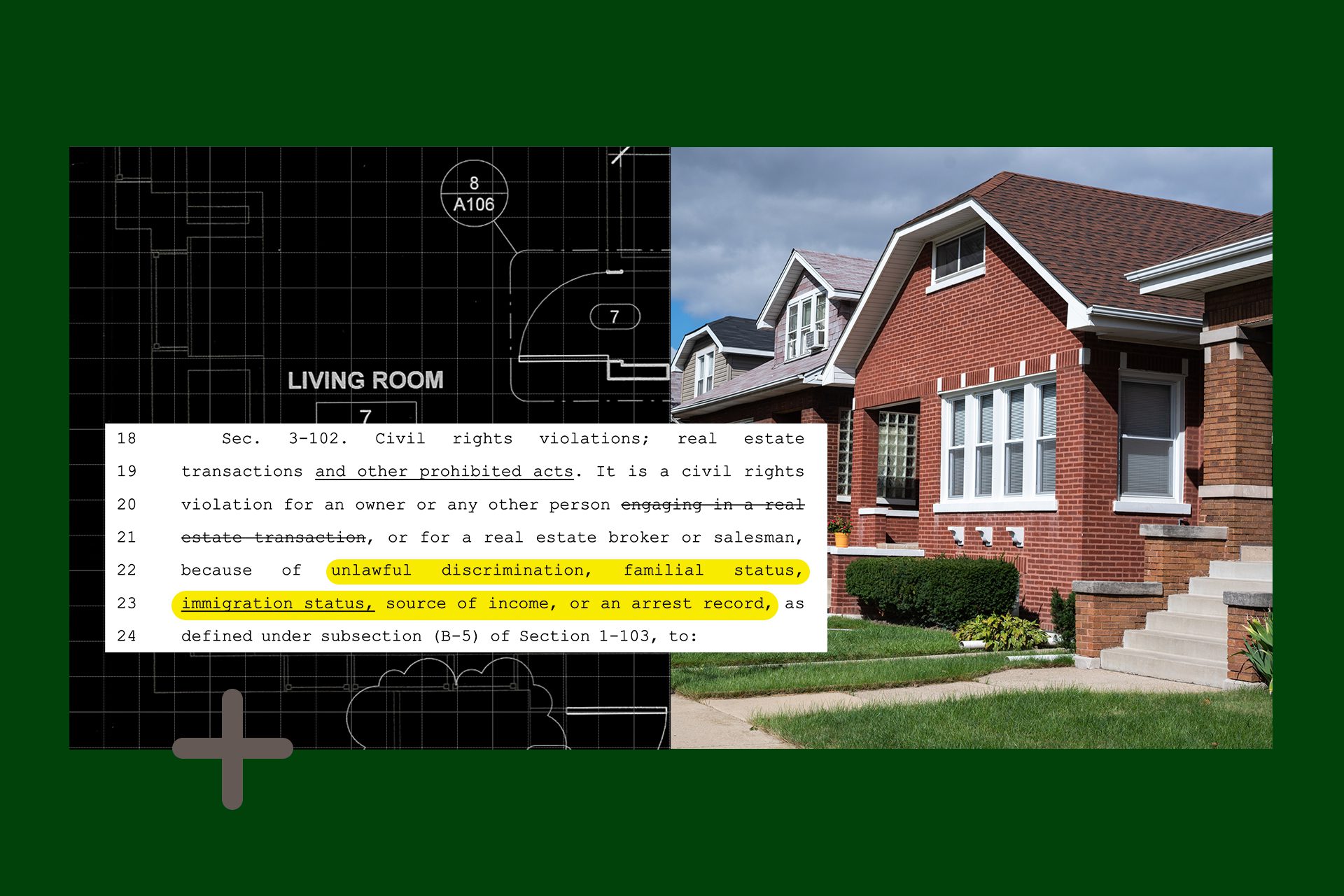 Ilustración fotográfica de Max Herman/Borderless Magazine. Foto de Max Herman
Ilustración fotográfica de Max Herman/Borderless Magazine. Foto de Max Herman Las protecciones ampliadas por el Estado prohíben a los proveedores de vivienda discriminar a una persona por su condición real o supuesta de inmigrante. Un abogado inmobiliario explica qué significa esta ley ampliada.
Los inmigrantes se han enfrentado durante mucho tiempo a desventajas a la hora de encontrar una vivienda adecuada, desde la discriminación a la falta de acceso a opciones asequibles.
A principios de este año, la Estado amplió el ámbito de aplicación de su Ley de Derechos Humanos para incluir la condición de inmigrante. La ley protege a las personas contra la discriminación en "vivienda, empleo, lugares de alojamiento público, crédito financiero y educación".
La ley prohíbe a los proveedores de vivienda discriminar a una persona por su "condición de inmigrante" real o percibida durante una transacción inmobiliaria, incluso al alquilar un apartamento, comprar una casa, solicitar una hipoteca o recibir servicios relacionados con la vivienda. Diana Mendoza Pacheco, abogada inmobiliaria con sede en Naperville, Illinois, ha centrado su trabajo en la intersección de la inmigración y el sector inmobiliario.
"No hay muchos abogados hispanohablantes que puedan explicar todo a nuestra comunidad y luego explicarles individualmente cómo determinadas consecuencias de la inmigración pueden afectar a sus transacciones inmobiliarias", dijo.
Mendoza Pacheco analiza la ampliación de la Ley de Derechos Humanos de Illinois y lo que significa para los inmigrantes.
Las respuestas han sido editadas para mayor extensión y claridad.
Noticias que ponen el poder en el punto de mira y a las comunidades en el centro.
Suscríbase a nuestro boletín gratuito y reciba actualizaciones dos veces por semana.
¿Qué importancia tiene ampliar la protección de los derechos humanos en el sector inmobiliario de Illinois?
Se trata de una ley más amplia que ya existía pero que se modificó para incluir la condición de inmigrante dentro de su clase protegida. Creo que una clave muy importante aquí es que sea real o percibida. Si usted no es ciudadano estadounidense, pero alguien o una entidad, como una institución de crédito, un arrendador o un vendedor y vendedor de bienes inmuebles, cree que usted tiene algún estatus y le discrimina, entonces esta ley le ofrecería protección, aunque usted no sea inmigrante.
¿Cómo era antes de que entrara en vigor esta ley?
La Ley de Derechos Humanos de Illinois, que ya estaba codificada, protegía a las personas implicadas en transacciones inmobiliarias, ya se tratara de la compra, el arrendamiento o la financiación de las mismas. Entre las clases protegidas figuran la raza, la edad, el estado civil y la orientación sexual. Anteriormente, el código no incluía el estatus migratorio. Estas clases específicas se han ampliado ahora para incluir la condición de inmigrante.
¿Qué se considera "estatus migratorio"? ¿A quién protege exactamente esta nueva ley? ¿A los ciudadanos y a los no ciudadanos?
Creo que es una distinción excelente porque algunas personas pueden percibir a los miembros de nuestra comunidad como indocumentados, no titulares de visado, o no ciudadanos cuando pueden muy bien ser ciudadanos, y actuarán de acuerdo con esas percepciones de forma discriminatoria, por lo que también les protege a ellos.
Por ejemplo, si un proveedor de vivienda que no está de acuerdo con la política de asilo te discrimina porque cree que estás aquí por asilo -aunque no seas asilado-, estás incluido en las protecciones. Esas protecciones se extienden porque te percibieron como parte de esa clase y actuaron de forma discriminatoria.
¿Cuáles son algunos ejemplos de infracciones? ¿Preguntar por la situación de inmigración como proveedor de alojamiento es una de ellas?
Si un prestamista se niega a proporcionar financiación a alguien porque no es ciudadano o residente, podría haber un argumento. Por ejemplo, si una persona tiene un estatus legal en EE.UU., como un visado o un permiso de residencia, y puede demostrar su capacidad para estar aquí y trabajar, negarse a concederle un préstamo podría ser discriminatorio. Si la persona puede demostrarlo, tal vez con una tarjeta de autorización de empleo, y el banco sigue negándose a ofrecerle un préstamo que de otro modo estaría disponible, esto podría considerarse discriminación.
Del mismo modo, si un agente inmobiliario se niega a aceptar clientes de un determinado origen nacional, como los venezolanos, porque sospecha que son solicitantes de asilo y no está de acuerdo con la política, también podría ser discriminatorio. El origen nacional ya es una clase protegida, pero si la negativa se basa en el estatus migratorio, podría dar pie a una causa de acción.
He aquí el problema: está muy bien que haya un caso manifiesto de discriminación que se pueda señalar claramente, pero en la práctica, las acciones discriminatorias no siempre son tan obvias. ¿Cómo demostrar que la intención de alguien se basa realmente en su estatus migratorio y nada más? Aunque es posible, en algunas situaciones flagrantes y obvias, es más difícil en los casos de prestamistas, agentes o vendedores que se niegan a trabajar con alguien. Tendría que demostrar una pauta de comportamiento mostrando cómo han tratado a otros de forma diferente. Esto requiere pruebas de que han actuado sistemáticamente de forma diferente con otras personas en situaciones similares.
¿Cómo se aplica esta nueva ley a los inquilinos existentes?
Sí. Por ejemplo, si un casero acepta tu solicitud pero luego te rechaza al descubrir que estás aquí por asilo, puede tener la idea preconcebida de que no podrás pagar el alquiler o no serás un buen inquilino. Si deciden no renovarle el contrato o se niegan a alquilárselo en primer lugar por su condición de inmigrante, podría tener una causa de acción. Si su negativa a renovarle el contrato se basa en su condición de inmigrante, usted forma parte de una clase protegida.
¿Cuáles son los ejemplos de infracciones de esta ley y las consecuencias de dichas infracciones?
Cuando presente una denuncia ante el Departamento de Derechos Humanos de Illinois, éste investigará el incidente. La persona acusada de discriminación tiene que tratar con este organismo estatutario, y la mayoría de la gente querrá contratar a un abogado. Esto se añade al coste de la defensa contra las alegaciones ante el departamento. Si la persona acusada de discriminación limpia su nombre ante el departamento, eso podría ser el final del asunto. Sin embargo, si se encuentran pruebas de discriminación, el caso podría proceder a un litigio civil a menos que ambas partes lleguen a un acuerdo.
El coste de la defensa contra tales demandas puede disuadir a la gente de actuar de forma discriminatoria. Tendrían que hacer frente a la investigación estatal y, si ésta no se resuelve a su favor, contratar a su propio abogado para la parte privada del caso. Si la situación se agrava, las sanciones y multas pueden ser importantes y los costes pueden prolongarse durante mucho tiempo. Estas investigaciones no son rápidas y puede resultar muy caro defenderse de ellas, por lo que las personas implicadas en transacciones inmobiliarias probablemente harían todo lo posible por evitar cualquier acción que pudiera considerarse discriminatoria. También se enfrentan a daños consecuenciales y punitivos permitidos por la Ley, que pueden ser muy costosos.
Si alguien en Illinois piensa que puede haber sido discriminado en una transacción inmobiliaria debido a su estatus migratorio real o percibido, ¿qué debe hacer?
Existe un mecanismo en el Departamento de Derechos Humanos de Illinois para investigar estos asuntos, por lo que es probable que esa sea su opción. punto de partida. (También se puede presentar una denuncia en línea.)
Muchas organizaciones sin ánimo de lucro ayudan a la gente a asumir estos casos de forma gratuita o a bajo coste. Sin embargo, debido a su condición de organización sin ánimo de lucro y a su gran volumen de trabajo, es posible que no reciba atención inmediata debido a la escasez de personal y al aumento de casos. No obstante, varias organizaciones sin ánimo de lucro ofrecen servicios jurídicos gratuitos que la gente puede aprovechar.
¿Por qué es importante esta ley?
En mi opinión, es bueno tener esto, al menos sobre el papel, ya que demuestra que Illinois valora la capacidad de todas las personas, independientemente de su estatus migratorio, para vivir, comprar y disfrutar de la propiedad en igualdad de condiciones. Demuestra que nos tomamos en serio estos valores como estado. Sin embargo, la facilidad o dificultad de aplicar esta política es totalmente diferente. Queda por ver la eficacia con que esta ley puede aplicarse en casos concretos. No obstante, como método, envía un fuerte mensaje sobre la postura de Illinois en el tema de la discriminación en la vivienda.
Este contenido ha sido posible gracias a una subvención de The Chicago Community Trust.


